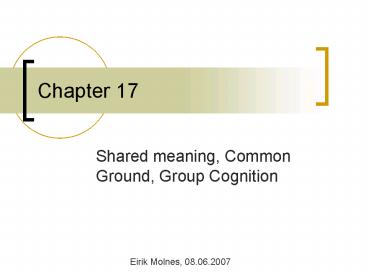Shared meaning, Common Ground, Group Cognition - PowerPoint PPT Presentation
1 / 19
Title:
Shared meaning, Common Ground, Group Cognition
Description:
Virtual Math Team Empirical study of how Group Cognition is constituted in ... assume that when a person express an opinion, he utteres a preconceived meaning ... – PowerPoint PPT presentation
Number of Views:31
Avg rating:3.0/5.0
Title: Shared meaning, Common Ground, Group Cognition
1
Chapter 17
- Shared meaning, Common Ground, Group Cognition
Eirik Molnes, 08.06.2007
2
Overview
- Critical look at the concept of Shared Meaning
- Critical look at the concept of Common Ground
- Virtual Math Team Empirical study of how Group
Cognition is constituted in practice
3
Group Cognition defining the CSCL paradigm of
research
- Prior to CSCL
- It is the individual who learns and thinks
- CSCL perspective
- It is the collaborative group who learns and
thinks (Koschmann 1999)
4
Theory of Shared Meaning
- Meaning
- Exists in the intersubjective world, and can be
interpeted from personal perspectives. - Group meaning
- Constructed by the interactions of the individual
members
5
Problem of Shared Meaning
- Common practice to assume that when a person
express an opinion, he utteres a preconceived
meaning - This reveals a conflict
- If meaning is socially constructed and shared,
why do we feel compelled to treat it as a private
property?
6
Problem of Shared Meaning II
- Shared Meaning
- Important in situations where knowledge is shared
- Shared Knowledge, three situations
- Similarity of indivuduals knowledge
- Knowledge that gets shared
- Group Knowledge
7
Two paradigms
- Ambiguity of Shared Knowledge corresponds to two
different paradigms of viewing group interaction
(Anna Sfarn) - Acquisition Metaphor
- Participation Metaphor
8
Acquisition Metaphor
- Thinks of education as a transfer of knowledge
commodities and their subsequent possession by
individual minds
9
Participation Metaphor
- Locates learning in intersubjective, social or
group processes and views the learning of
individuals in terms of their changing
participation in the group interactions.
10
A Conflict of Paradigms
- Collaborative learning tendency to construe
learning as something taking place in the
individual mind. - CSCL 02 conference, Koschmann
- Talk about knowledge as a thing that can be
acquired should be replaced with discussion of
meaning making in the context of joint activity
11
Conflict of Paradigms II
- Stahl solution
- Make explicit when one is referring to individual
subjective understanding, and when one is
referring to group intersubjective understanding - Problem
- Hard for most people to imagine how a group can
have knowledge
12
The Range of Views
- Many different views on how learning takes place.
(page 351) - Theories that focus on the group as a possible
unit of knowledge construction (page 352)
13
Theory of Common Ground
- Used to explain how collaborative understanding
is possible - Grounding
- Mutual understanding
- Clark and Brennan 1991 (CA)
- Grounding is a collective process by which
participants try to reach mutual belief - CSCL-Common Ground
- Concerned with short-term negotiation of common
ground during interactions
14
Critique of Clarks common ground
- Operating Room (Koschmann and LeBaron)
- Argues that the notion of belief that contributes
to a common ground, is not useful to
understanding the construction of shared
understanding. - Vygotsky
- Individual developmental level vs. social
developmental level. - Indicates that group interactions cannot be
reduced to individual behavior.
15
Empirical Inquiry into Group Cognitive Practives
- Virtual Math Teams (VMT)
- Drexel University
- Goal Can knowledge sharing in community
contexts, construct group knowing and shared
meaning that exceeds the knowledge of the groups
individual members?
16
Virtual Math Team
- Collaborative online math program
- Chatrooms (4 persons)
- Solve a problem in 1 hour
- Logged interaction
- Analyzed groups and individuals over a long
timespan - Adult feedback, but not while solving the
problems
17
Virtual Math Team II
- Analyze student interaction to find out how they
build Shared Knowledge - Try to document concrete situations where groups
can have knowledge that is disctinct form the
knowledge of the group
18
Virtual Math Team III
- Overcome the AM/PM paradigm conflict?
- Clarify meaning making in the context of joint
activity - Individual vs. Group Knowledge
- Issues for further investigations
- Page 360
19
Questions?































